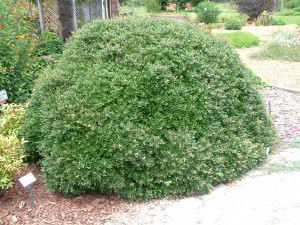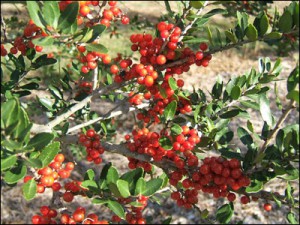Yaupon hollies (Ilex vomitoria) are evergreen, provide great fall/winter color, and can adapt to numerous landscape situations. They are also very durable and can survive extreme drought.
Characteristics
Yaupon hollies are dioecious, meaning male and female flowers are produced on separate plants and berries are only produced on female plants. Flowers are creamy white, but not showy on both male and female plants and berries can range in color from red to yellow depending on cultivar. The plants are favored by wildlife – pollinators are attracted to the flowers and birds love the berries.
Yaupon hollies are native plants with a number of different cultivars available at plant nurseries. ‘Jewel’ is a cultivar that produces an ubundance of red berries and ‘Aureo’ produces yellow berries. ‘Nana’, a dwarf, compact male cultivar is an excellent replacement for boxwoods. Large growing cultivars can grow to 15 to 25 feet tall and can be shaped as trees or left as large shrubs. ‘Folsom’s Weeping’ and ‘Pendula’ are two weeping cultivars that can be utilized as dramatic specimen trees.

Dwarf Yaupon hollies will naturally form a mound without pruning.
Credit: Beth Bolles, UF IFAS Extension Escambia County
Plant Care
Yaupon hollies prefer to be planted in full to partial sun. It is important to note that they are drought tolerant and require a site with well-drained soil. Because only the female plants produce berries, it is best to purchase plant material when plants contain berries in late fall and winter. Yaupon hollies spread readily by vegetative sprouts. Sprouts should be pruned down to the soil line 2 – 3 times per year. They do not have many disease or insect problems, but scale, leaf miners, mites, and aphids can sometimes be a problem.
Fun Facts
The leaves of the yaupon holly contain a higher caffeine content than any other plant native to North America. The Seminole Indians would purposely brew a concentrated “Black Drink” tea to induce vomiting and diarrhea for believed purification. Southerners utilized the caffeine in the leaves during the Civil War. If the leaves are steeped for a short period, a black tea or coffee substitute can brewed. A related species of holly (Ilex paraguariensis) from Brazil is used to make a drink called Yerba Mate, which is as popular in South America as coffee is in North America.
For more information on yaupon hollies, please visit the publication located at this link https://edis.ifas.ufl.edu/st311.
- Is a Limequat a Lime or a Kumquat? - December 26, 2025
- Gardening in the Panhandle LIVE! Program Summary: Pests of Florida Lawns and Landscape Plants - May 28, 2025
- Fun Facts About Ferns - April 30, 2025

